zhen-ni
39 posts
珍妮 | mandarin langblr | uni graduateTESL and CHIN major
Last active 60 minutes ago
Don't wanna be here? Send us removal request.
Photo
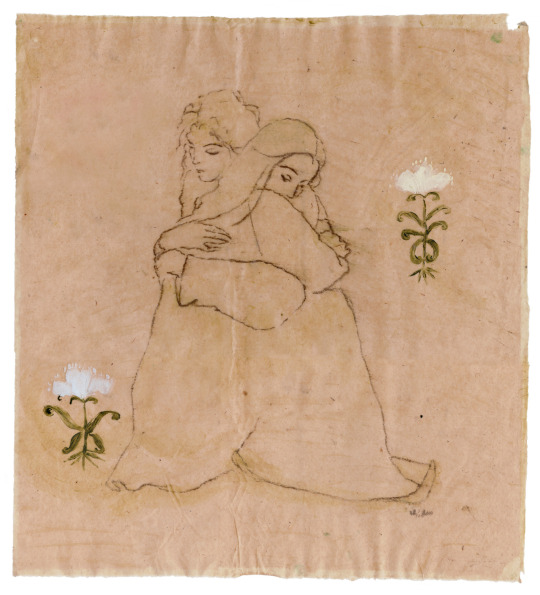
‘The hug is a petal that envelopes history’
2023
Zhang Yidan (Instagram)
18K notes
·
View notes
Photo

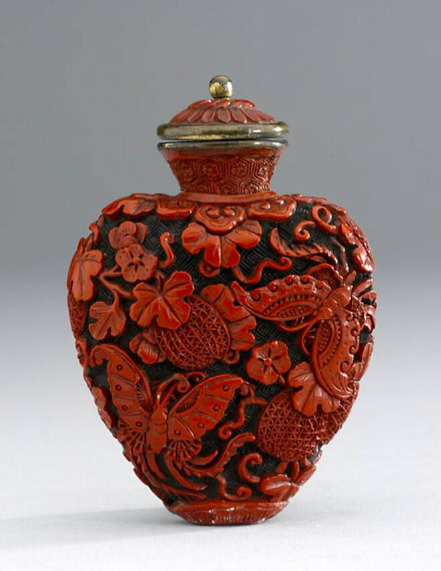

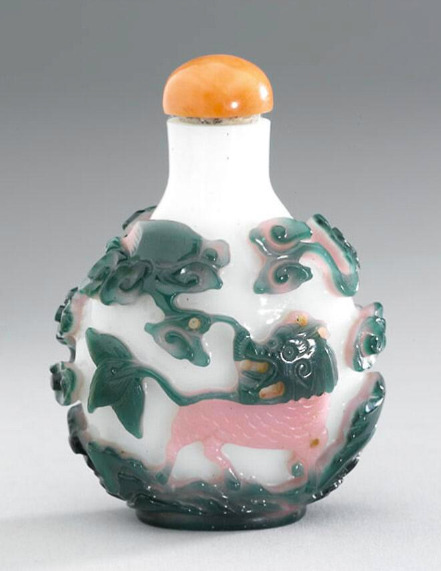


qing dynasty snuff bottles, mid 18th-19th century
18K notes
·
View notes
Text
Two Things About Writing/Signs That Surprised Me in China
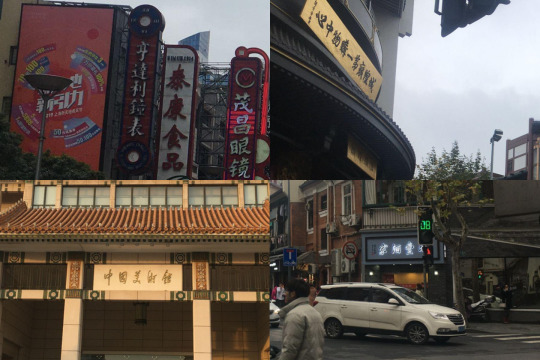
I encountered a lot more traditional characters than I ever expected. In retrospect, this makes a lot of sense. The systemic simplification of Chinese characters was not that long ago after all! But I was not expecting it (outside of places like historic sites).
I also saw a fair amount of right-to-left text. I sometimes see top-to-bottom & right-to-left text online, but in China I saw a lot of single-line right-to-left text, so it basically just looked like something written backwards. It really threw me off!
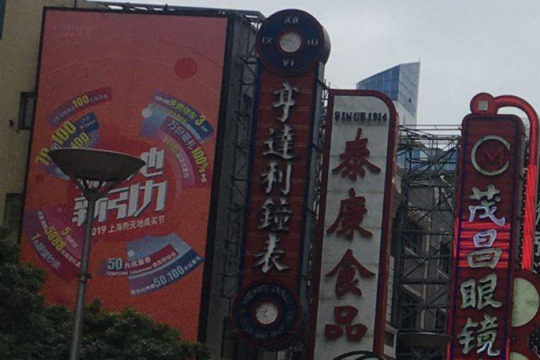
Here is a sign somewhere in Shanghai reading 亨達利鐘表. Not sure why they didn’t write 錶 because the traditional version of 钟表 is 鐘錶…Anyway, the simplified version would be 亨达利钟表.
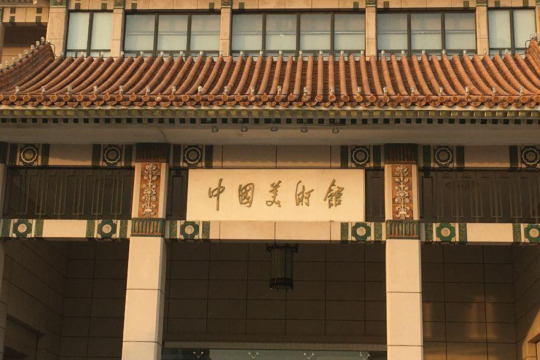
The cursive-like script is a bit hard for me to decipher, but it says 中國美術館 (AKA 中国美术馆, the National Art Museum of China). I think it makes sense to use traditional characters for an art museum!
Keep reading
247 notes
·
View notes
Text
Classical Chinese: a quick sketch
I’m taking the Outlier Linguistics course in Classical Chinese, which uses Michael Fuller’s Introduction to Classical Chinese as a textbook. Obligatory note: I am STILL LEARNING. I may get things wrong. These are based on my notes from those lectures, and a little bit of my own research. I should post one or two of these a week until June.
Before starting the course proper, let’s talk a little bit about Classical Chinese as a concept, and where it fits into the history of the Chinese language! When talking about the history of Chinese, it’s important to distinguish between the spoken and the written language, because the two don’t line up particularly well.
For our purposes, only Old and Middle Chinese are relevant when talking about the spoken language.
Terminology:
Classical Chinese refers to a period in history where the language was written, linguists think, roughly as it was spoken. Literary Chinese, on the other hand, refers to a written literary tradition a bit like Latin that was used as a lingua franca throughout much of the Sinosphere up until the 20th century and became highly stylised. You can think of its use a bit like Medieval Latin: it was a language that nobody spoke, but the educated and elite would be expected to write in it, thus producing a system of diglossia (a society with two languages used in different social purposes).
Classical Chinese is referred to as 古文 in Chinese, and Literary Chinese 文言文. HOWEVER. Much like the uses of the terms in English (and I’ve got this wrong before too!!), non-specialists use them pretty much interchangeably. Most people use 古文 to refer to just the really old stuff, but 文言文 appears to be used for both.
Old Chinese:
This period lasts from around the 13th century BCE to about the 3rd century CE, though individual linguists differ on exact dates. This lasts through Shang dynasty, Western Zhou, Eastern Zhou (Spring and Autumn and Warring States periods), the Qin dynasty and into the early part of the Han dynasty. This course doesn’t go much later than the Han dynasty.
The earliest inscriptions in Chinese were found during the Shang dynasty around 1250BC; the Old Chinese period is generally understood as persisting into the late Zhou dynasty. The earliest inscriptions were on oracle bones, and don’t tell us very much - the texts are highly ritualised and formulaic, and exhibit a very limited range of structures. The writing system - as we are Very Aware - is not particularly phonetic. There’s also a huge lack of information about these very early inscriptions: only about 50% of all characters have even been identified.
After oracle bone inscriptions, from around 1000 BC texts survive as bronze inscriptions. There are also copies that preserve earlier texts that survive from later periods - these are written on ink on bamboo and wooden slips, and later on silk and paper.
The bronze inscriptions that survive are much more helpful than the oracle bone inscriptions: they exhibit sufficient variety to be informative about the language, and the amount of characters identified is much higher!
Old Chinese is very different from Chinese as we know it: it didn’t have tone (that developed later, towards the Middle Chinese period), it had much more complex syllable structures with consonant clusters at both the beginning and end of the syllable, and it generally lacked a lot of the phonological characteristics we know and love about modern Chinese. It was a mainly monosyllabic language, and highly dense. Many of the very early disyllabic words like Zhuangzi’s famous butterfly (蝴蝶)actually appear to be early loanwords.
Its grammar was also very different: it actually had morphology! Shock! Gasp! This morphology appears to be pretty exclusively derivational (so making new words out of other words like ‘helpful’ versus 'unhelpful’, not 'go’ versus 'goes’), but still, for modern learners - very exciting! It had a load of causative prefixes and suffixes, as well as stuff that changed the transitivity of verbs, made nouns into verbs, verbs into nouns and so on. This is VERY interesting, especially because Middle Chinese appears to have gotten rid of it pretty much entirely. It also seemed to be much less reliant on particles than Middle Chinese, and had some interesting word order stuff (sometimes, for example, the object could come before the verb!).
Middle Chinese
Middle Chinese lasts from around the 4th century to around the 12th. A LOT of changes took place during this time: most importantly, suffixes and prefixes were dropped, and tones developed. Why did this happen? I’ll do a post on this in more detail, but basically: the Old Chinese syllable was pretty complex, and when these final consonants were lost, the syllable preserved complexity by turning the loss of specific consonants into tones. So the loss of an -s became 去声, for example. What this means in practice is that there are loads of words that in Classical (and Literary) Chinese have at least two different readings. Some of these are preserved down to the modern day! So think of 好: when third tone, it’s a stative verb (good), and when fourth tone, it means to like. This is because of a suffix that was originally at the end of the verb that has since disappeared, changing the tone! 王 is similar: when it means 'king’, it’s pronounced with the second tone. When it means 'to rule over’, it’s pronounced with the fourth. These mysterious old suffixes are the reason why!
On that note: the tones in Middle Chinese are not the same as the tones in Mandarin: there’s a lot of complex development that happened there. But because of things like qieyun rhyming dictionaries and early poems from the Shijing, we know that Middle Chinese had four tones - 平,上,去 and 入 . How these developed into modern Mandarin tones (and Cantonese, and other groups) is a topic for another post! When reading Classical Chinese, it’s fine to use the modern tones.
During this period, multi-syllable words also become more common! This makes sense, right: if your syllables get drastically less complicated, there are way more words that sound similar. Solution? A) develop tones, and B) start sticking words together to help disambiguation.
Literary language:
Pre-Classical Chinese refers to the literary language, from around 13th to the 5th century BCE. This period covers the Five Classics: 尚书,诗经,易经,春秋,and 礼记. It’s worth noting that these classics are substantially different from Classical Chinese proper: they are extremely dense and don’t use a lot of the later particles preferred by Classical Chinese. In fact, they are so dense that even people during Confucius’ time used commentaries to understand what they were saying. Go figure.
Classical Chinese roughly refers to the period between the 4th and 1st century BCE. You’ll see again that this really doesn’t line up particularly nicely with the dates we had for Old and Middle Chinese - the Spring and Autumn period at the end of the Eastern Zhou dynasty is when Classical Chinese proper starts kicking off. That’s roughly the time Confucius and Mencius were alive. It ends during the Han dynasty, and transitions to Literary Chinese. During this period, writing and speaking are thought to align fairly closely.
Post-Classical Chinese refers to a transitional period between the 1st and 3rd century CE. During the Han dynasty and a bit earlier (so during the Warring States period) there was an explosion of writing and new literary styles: what this did was provide a load of 'model texts’ which later authors would emulate, thus ensuring some kind of standard that was increasingly different from the spoken language. It also established certain authors as authors to…well, to memorise. In the civil exams, it was expected that candidates would be able to quote from passages at random and know works of earlier authors by heart: this served to cement the importance of certain literary styles, which were kept long after the language had changed.
Literary Chinese was used as a lingua franca after the 3rd century CE up until the 20th century. There are still certain writers that write textbooks for example in a very literary style, as well as poetry, so it hasn’t totally vanished. It’s also taught widely in schools: of the textbook I have, apparently most Chinese students would be familiar or have memorised most of the texts by the end of high school. Formal language is still heavily based on Literary Chinese, and a knowledge of Literary Chinese is thus hugely helpful in reading any news or…yeah, literature. Later (so Qing dynasty etc) Literary Chinese is easier for native speakers, but tends to be apparently more difficult for non-natives, because of the sheer amount of cultural knowledge and capital readers are assumed to be familiar with. This is why this course starts at the Classical period proper: for students who are interested in earlier texts, it’s a good place to start, and you can work forwards from there if your interest is in Tang texts, Qing literature etc.
Very importantly: many later related imitated pre-Qin Classical Chinese, and not Han Classical Chinese. This means that features that were actually already becoming more common during the Han period (so disyllabic words and noun classifiers for instance) are not used in Literary Chinese, even though they were already common at the time of writing. Sigh.
Notes on literary readings and variants:
Some characters have different literary pronunciations to what we’re used to in modern Chinese. These are not the 'Old Chinese’ pronunciations, but rather how a character would be pronounced in the modern age following regular rules of sound change, if things hadn’t gone weird. Many Chinese languages have a tradition of 'literary’ readings of certain characters: Cantonese and Min for example maintain a strict difference between colloquial and literary readings. Mandarin…doesn’t, as much, and even the few characters that have a different literary reading (so for example 他 is read as 'tuō’, not 'tā) are only used really in more conservative circles. But you may still see them.
Strictly speaking, when reading Classical Chinese you shouldn’t employ tone sandhi for characters like 不 and 一. Again, different people will do this differently!
Some characters have literary written variants. This is not necessarily the traditional character, but a different version of the character that for whatever reason is more common in literary texts. For example 为: the normal traditional character is 為, but the one that often appears in Classical texts is 爲. They’re just different versions.
Alright, that’s enough for today! As ever, if you spot any typos or mistakes, do let me know. I’ll write up the first lesson in the next few days, and expect a post on Old Chinese phonology and the development of tone coming soon!! Stay tuned!
- 加油!
- 梅晨曦
200 notes
·
View notes
Note
do you have any tips on how not to write down every new word you come across while reading a book in chinese? 😅
So I don't really think there's anything wrong with writing down every new word you encounter while reading, but I do think there are certain methods that are more useful than others.
The way I wrote down new words when I first started reading Chinese novels was pretty simple: I had a notebook where I'd write down all the words as I read, and I wouldn't look any of them up until I'd finished reading a certain chunk of text (e.g., a page or two, or a chapter depending on how long it was).
I didn't set any limits for how many words I could write down, or which new words I should prioritize; if I didn't know it I would write it down and keep reading. I really only had one rule: I could not stop to look up a word as I was reading. The only exception to this rule was if I encountered a new word that was absolutely crucial to the sentence/plot, and I couldn't understand what was happening without understanding that word. In my opinion, this is a happy medium between extensive and intensive reading.
If you stop to write down a new word and look up its meaning immediately, you're just wasting time and slowing yourself down. Don't do that.
I personally still write down new and interesting words I encounter, but I don't wrote down every new word now.
As for how to not write down every new word, all I can tell you is: practice. The more you read, the more words you pick up, and the better you get at guessing what words mean from context. It's a slow process, but it's effective.
You could also do a lot of flashcards of the most common words and characters on the side as well, which is something I've seen other people do. I'm not much of a flashcard person though, so I'm not the best person to ask about this kind of method.
The final thing I'll say is this: starting to read books in your target language will always be incredibly hard, and there will always be an avalanche of new words when you first start. One of the reasons I liked writing down every new word I read was that it gave me a more tangible way to measure my progress. I would look back and see as the number of new words I encountered on each page got smaller and smaller, until I could finally go multiple pages without seeing a word I didn't know. I find it encouraging to have this record of my past progress, so that I can look back and see how far I've come. I personally find that really encouraging.
82 notes
·
View notes
Text
I have just discovered a new app for reading practice and it looks pretty good!

It's called Dot and it has short dialogues, several of which are based on current news topics, from beginner to advanced levels.
The levels are based on the new HSK.3 so level 1 is hard for a newbie, but pretty readable for my current level (between 2 and 3 in HSK.2).
There are vocabulary exercises you can do after you read each text, and they unlock other (presumably slightly more challenging) texts. But even if you don' do the exercises, there is plenty to read and new texts are added often.
I found 2 issues with the exercises: sometimes you have to choose the pinyin for the character, but the option available is for a different meaning of the same character (for example, the character was 行 xíng but I had to click on "háng", even in a listening exercise when the audio clearly said "xíng"!), and there are writing exercises but on my device, when I tried to write, it would scroll up/down instead so I gave up. But you can turn off the writing and listening exercises in the settings.
135 notes
·
View notes
Text
this is definitely not the link to a google drive with free mandarin chinese practice books, definitely not
5K notes
·
View notes
Text
A Closer Look at Chinese Names

This post has been a long time coming. In spring 2020, I posted two of the most popular posts on this blog:
Reading Chinese Names: Female Names
Reading Chinese Names: Male Names
More recently I have wanted to revisit the idea behind those posts but with a different, more in-depth approach. I also made some decisions while compiling data for those posts that I now regret. So in late summer 2021, I set out to completely redo my data collection with the eventual goal of creating this very post.
About the Data
I will include more information about my data collection process at the end of this post for those interested.
I gathered 3,277 names (1602 male, 1675 female) from idol shows and groups. In the grand scheme of things, this is not a lot of names at all. But I think it's enough that we can explore names, observe some generalities, and have fun! These names belong to individuals roughly 15-30 years old. Most names belong to individuals from Mainland China, but there are some Hong Konger and Taiwanese names as well.
Some of the name sources include:
偶像练习生/青春有你
创造101/创造营
明日之子
以团之名/少年之名
SNH48
快乐女声/快乐男声
菱格世代DD52
Various groups like 时代少年 and SING女团
I also wanted to note something important: the definitions I am using (via MDBG) are only the surface. For example, a name containing a character meaning jade might also have implications of beauty and virtue. So the meaning is more than just "jade." However, it just isn't practical to go into all the nitty gritty here. I encourage you to seek out more resources if you are interested.
Some Thanks
Thanks so much to @liu-anhuaming, @meichenxi, and my friend Tiffany for their help and advice during the process of creating this post! 非常感谢你们,你们是最棒的!
Given Names (Overall)

First let's look at the most common characters for ALL the given names in the dataset. There were 1093 total unique characters across all the given names. I'm going to include more characters (almost rounding out the top 100) at the bottom of this post for those interested. There is also some information broken down by gender below.
Top Given Name Characters
宇 yǔ - room, universe / 87
子 zǐ - son, child, seed, egg, small thing, 1st earthly branch, midnight, 11th solar month, year of the Rat, fourth of five orders of nobility, ancient Chinese compass point / 82
佳 jiā - beautiful, fine, good / 68
雨 yǔ - rain / 63
嘉 jiā - excellent, auspicious, to praise, to commend / 59
文 wén - language, culture, writing, formal, literary, gentle / 58
欣 xīn - happy / 55
一 yī - one, 1, single, a (article), as soon as, entire, whole, all, throughout / 51
俊 jùn - smart, eminent, handsome, talented / 51
思 sī - to think, to consider / 49
杰 jié - hero, heroic, outstanding person, prominent, distinguished / 49
豪 háo - grand, heroic / 48
怡 yí - harmony, pleased / 45
天 tiān - day, sky, heaven / 44
泽 zé - pool, pond, (of metals etc) luster, favor or beneficence, damp, moist / 43
琪 qí - fine jade / 40
婷 tíng - graceful / 39
鑫 xīn - prosperity / 38
晓 xiǎo - dawn, daybreak, to know, to let sb know, to make explicit / 35
浩 hào - grand, vast (water) / 35
晨 chén - morning, dawn, daybreak / 34
恩 ēn - favor, grace, kindness / 33
博 bó - extensive, ample, rich, obtain, aim, to win, to get, plentiful / 32
慧 huì - intelligent / 32
明 míng - bright, clear, to understand, wise / 32
轩 xuān - pavilion with a view, high, tall / 32
辰 chén - 5th earthly branch, 3rd solar month, year of the Dragon, ancient Chinese compass point / 32
Top Given Name Characters (Female)
佳 jiā - beautiful, fine, good / 56
雨 yǔ - rain / 50
欣 xīn - happy / 49
怡 yí - harmony, pleased / 44
婷 tíng - graceful / 39
嘉 jiā - excellent, auspicious, to praise, to commend / 37
琪 qí - fine jade / 35
思 sī - to think, to consider / 33
慧 huì - intelligent / 31
梦 mèng - dream, to dream / 30
Top Given Name Characters (Male)
宇 yǔ - room, universe / 68
子 zǐ - son, child, seed, egg, small thing, 1st earthly branch, midnight, 11th solar month, year of the Rat, fourth of five orders of nobility, ancient Chinese compass point / 55
豪 háo - grand, heroic / 48
杰 jié - hero, heroic, outstanding person, prominent, distinguished / 47
俊 jùn - smart, eminent, handsome, talented / 45
泽 zé - pool, pond, (of metals etc) luster, favor or beneficence, damp, moist / 38
浩 hào - grand, vast (water) / 35
一 yī - one, 1, single, a (article), as soon as, entire, whole, all, throughout / 34
文 wén - language, culture, writing, formal, literary, gentle / 32
明 míng - bright, clear, to understand, wise / 27
Single-Character Names (单名)

There were 668 single-character names, which is about 20% of the total names. I know that 单名 are pretty rare in Taiwan (I'm not sure about Hong Kong), so that's something to keep in mind. More of the top 单名 are at the bottom of this post.
Top Single-Character Names
鑫 xīn - prosperity / 12
欣 xīn - happy / 10
洋 yáng - ocean, vast, foreign, silver dollar or coin / 9
静 jìng - still, calm, quiet, not moving / 7
丹 dān - red, pellet, powder, cinnabar / 6
娜 nà - graceful, elegant, beautiful / 6
恩 ēn - favor, grace, kindness / 6
敏 mǐn - quick, nimble, agile, clever, smart / 6
昕 xīn - dawn / 6
雪 xuě - snow / 6
颖 yǐng - head of grain, husk, tip, point, clever, gifted, outstanding / 6
Female Single-Character Names
欣 xīn - happy / 9
鑫 xīn - prosperity / 8
静 jìng - still, calm, quiet, not moving / 7
丹 dān - red, pellet, powder, cinnabar / 6
娜 nà - graceful, elegant, beautiful / 6
敏 mǐn - quick, nimble, agile, clever, smart / 6
雪 xuě - snow / 6
倩 qiàn - pretty, winsome / 5
洁 jié - clean / 5
颖 yǐng - head of grain, husk, tip, point, clever, gifted, outstanding / 5
Male Single-Character Names
洋 yáng - ocean, vast, foreign, silver dollar or coin / 7
恩 ēn - favor, grace, kindness / 5
杰 jié - hero, heroic, outstanding person, prominent, distinguished / 5
宇 yǔ - room, universe / 4
浩 hào - grand, vast (water) / 4
涛 tāo - big wave / 4 (Taiwan pr. táo)
硕 shuò - large, big / 4
磊 lěi - lumpy, rock pile, uneven, sincere, open and honest / 4
立 lì - to stand, to set up, to establish, to lay down, to draw up, at once, immediately / 4
耀 yào - brilliant, glorious / 4
聪 cōng - wise, clever, sharp-witted, intelligent, acute, quick at hearing / 4
超 chāo - to exceed, to overtake, to surpass, to transcend, to pass, to cross, ultra, super / 4
鑫 xīn - prosperity / 4
鹏 péng - large fabulous bird / 4
Two-Character Names (双名)
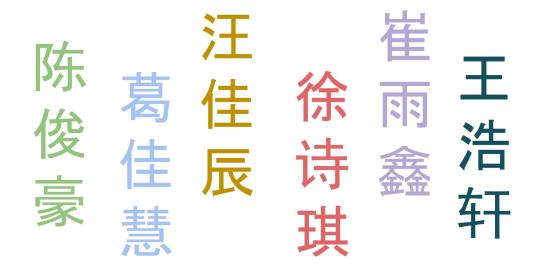
For the lists below, I removed all 单名 and just looked at 双名 characters. One of the things I was most excited to examine in this post was what characters tend to be found in the first vs. second positions. As you will see reflected below, some common characters used in names tend to occur more in one position, like 子 which is more prevalent in the first position. Others are more balanced. I bolded characters appearing in both positions.
Additional top 双名 can be found at the end of this post.
Top Two-Character Names
俊杰 jùnjié / 7
佳怡 jiāyí / 5
嘉欣 jiāxīn / 5
天宇 tiānyǔ / 5
浩然 hàorán / 5
婷婷 tíngtíng / 4
子杰 zǐjié / 4
安琪 ānqí / 4
Top First Characters
子 zǐ - son, child, seed, egg, small thing, 1st earthly branch, midnight, 11th solar month, year of the Rat, fourth of five orders of nobility, ancient Chinese compass point / 72
嘉 jiā - excellent, auspicious, to praise, to commend / 49
佳 jiā - beautiful, fine, good / 48
思 sī - to think, to consider / 44
一 yī - one, 1, single, a (article), as soon as, entire, whole, all, throughout / 40
俊 jùn - smart, eminent, handsome, talented / 40
雨 yǔ - rain / 36
天 tiān - day, sky, heaven / 34
宇 yǔ - room, universe / 34
晓 xiǎo - dawn, daybreak, to know, to let sb know, to make explicit / 34
Top Second Characters
宇 yǔ - room, universe / 48
豪 háo - grand, heroic / 45
杰 jié - hero, heroic, outstanding person, prominent, distinguished / 41
琪 qí - fine jade / 34
文 wén - language, culture, writing, formal, literary, gentle / 32
怡 yí - harmony, pleased / 30
婷 tíng - graceful / 29
轩 xuān - pavilion with a view, high, tall / 27
辰 chén - 5th earthly branch, 3rd solar month, year of the Dragon, ancient Chinese compass point / 26
欣 xīn - happy / 23
涵 hán - to contain, to include, culvert / 23
雨 yǔ - rain / 23
Female First Characters
佳 jiā - beautiful, fine, good / 38
嘉 jiā - excellent, auspicious, to praise, to commend / 31
思 sī - to think, to consider / 29
雨 yǔ - rain / 27
晓 xiǎo - dawn, daybreak, to know, to let sb know, to make explicit / 26
诗 shī - poem, poetry, verse / 24
梦 mèng - dream, to dream / 22
小 xiǎo - small, tiny, few, young / 20
欣 xīn - happy / 19
雅 yǎ - elegant / 19
Female Second Characters
琪 qí - fine jade / 30
婷 tíng - graceful / 29
怡 yí - harmony, pleased / 29
欣 xīn - happy / 21
雨 yǔ - rain / 21
君 jūn - monarch, lord, gentleman, ruler / 19
慧 huì - intelligent / 18
涵 hán - to contain, to include, culvert / 18
瑶 yáo - jade, precious stone, mother-of-pearl, nacre, precious / 17
莹 yíng - luster of gems / 16
Male First Characters
子 zǐ - son, child, seed, egg, small thing, 1st earthly branch, midnight, 11th solar month, year of the Rat, fourth of five orders of nobility, ancient Chinese compass point / 54
俊 jùn - smart, eminent, handsome, talented / 35
一 yī - one, 1, single, a (article), as soon as, entire, whole, all, throughout / 26
浩 hào - grand, vast (water) / 24
泽 zé - pool, pond, (of metals etc) luster, favor or beneficence, damp, moist / 22
宇 yǔ - room, universe / 20
明 míng - bright, clear, to understand, wise / 20
天 tiān - day, sky, heaven / 19
嘉 jiā - excellent, auspicious, to praise, to commend / 18
柏 bó - cedar, cypress / 17
Male Second Characters
豪 háo - grand, heroic / 45
宇 yǔ - room, universe / 44
杰 jié - hero, heroic, outstanding person, prominent, distinguished / 40
轩 xuān - pavilion with a view, high, tall / 21
辰 chén - 5th earthly branch, 3rd solar month, year of the Dragon, ancient Chinese compass point / 20
翔 xiáng - to soar, to glide / 19
文 wén - language, culture, writing, formal, literary, gentle / 17
霖 lín - continued rain / 17
铭 míng - to engrave, inscribed motto / 15
泽 zé - pool, pond, (of metals etc) luster, favor or beneficence, damp, moist / 14
鑫 xīn - prosperity / 14
龙 lóng - dragon, imperial / 14
Comparing Characters by Position
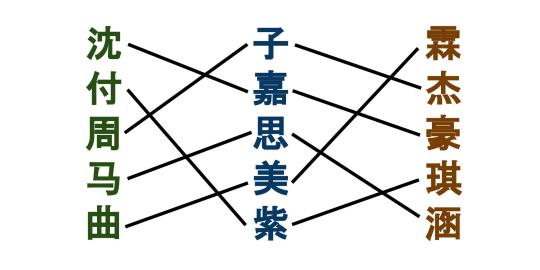
After examining the most popular characters by position, I was curious to look more specifically at which characters appear in one position but not the other. In this section I decided not to include lists separated by gender because it was getting to be too much information.
Exclusively First Characters
Below are the top characters that never appeared in the second position.
晓 xiǎo - dawn, daybreak, to know, to let sb know, to make explicit / 34
小 xiǎo - small, tiny, few, young / 24
紫 zǐ - purple, violet / 16
美 měi - beautiful, very satisfactory, good, to beautify, to be pleased with oneself / 15
若 ruò - to seem, like, as if / 14
智 zhì - wisdom, knowledge / 13
书 shū - book, letter, document, to write / 11
婉 wǎn - graceful, tactful / 11
振 zhèn - to shake, to flap, to vibrate, to resonate, to rise up with spirit, to rouse oneself / 11
永 yǒng - forever, always, perpetual / 11
秋 qiū - autumn, fall, harvest time / 11
Largest Deltas (First Position)
I also wanted to see characters that were found in both positions but for which there was a big difference in occurrence. I bolded characters that appeared both here and in the list above.
The math is formatted: # times first position - # times second position = difference
子 zǐ - son, child, seed, egg, small thing, 1st earthly branch, midnight, 11th solar month, year of the Rat, fourth of five orders of nobility, ancient Chinese compass point / 72 - 10 = 62
思 sī - to think, to consider / 44 - 4 = 40
嘉 jiā - excellent, auspicious, to praise, to commend / 49 - 10 = 39
晓 xiǎo - dawn, daybreak, to know, to let sb know, to make explicit / 34 - 0 = 34
佳 jiā - beautiful, fine, good / 48 - 15 = 33
一 yī - one, 1, single, a (article), as soon as, entire, whole, all, throughout / 40 - 9 = 31
俊 jùn - smart, eminent, handsome, talented / 40 - 9 = 31
天 tiān - day, sky, heaven / 34 - 7 = 27
小 xiǎo - small, tiny, few, young / 24 - 0 = 24
诗 shī - poem, poetry, verse / 24 - 2 = 22
Exclusively Second Characters
豪 háo - grand, heroic / 45
霖 lín - continued rain / 22
然 rán - correct, right, so, thus, like this / 20
琦 qí - curio, valuable stone / 17
仪 yí - apparatus, rites, appearance, present, ceremony / 14
航 háng - boat, ship, craft, to navigate, to sail, to fly / 13
晴 qíng - clear, fine (weather) / 12
萱 xuān - orange day-lily / 12
帆 fān - sail, to gallop / 11 (Taiwan pr. fán)
璇 xuán - jade / 9
Largest Deltas (Second Position)
豪 háo - grand, heroic / 45 - 0 = 45
杰 jié - hero, heroic, outstanding person, prominent, distinguished / 41 - 3 = 38
琪 qí - fine jade / 34 - 2 = 32
婷 tíng - graceful / 29 - 6 = 23
辰 chén - 5th earthly branch, 3rd solar month, year of the Dragon, ancient Chinese compass point / 26 - 3 = 23
轩 xuān - pavilion with a view, high, tall / 27 - 5 = 22
霖 lín - continued rain / 22 - 0 = 22
涵 hán - to contain, to include, culvert / 23 - 2 = 21
然 rán - correct, right, so, thus, like this / 20 - 0 = 20
怡 yí - harmony, pleased / 30 - 13 = 17
君 jūn - monarch, lord, gentleman, ruler / 22 - 5 = 17
琦 qí - curio, valuable stone / 17 - 0 = 17
Gender Associations of Characters

This section is more experimental and exploratory. There are probably better ways to examine the gender association for characters, but I just wanted to take a quick look for fun, not develop a whole new analysis technique.
Gender Neutral Characters
Here I simply took the average of the ranks of each character for male names and female names. If a character was only found in male names or only found in female names, it would just end up with the overall rank of N/A.
The math is formatted: (Female names rank + male names rank) ÷ 2 = average rank
子 zǐ - son, child, seed, egg, small thing, 1st earthly branch, midnight, 11th solar month, year of the Rat, fourth of five orders of nobility, ancient Chinese compass point (12th + 2nd) ÷ 2 = 7th (82 times)
嘉 jiā - excellent, auspicious, to praise, to commend (6th + 18th) ÷ 2 = 12th (59 times)
文 wén - language, culture, writing, formal, literary, gentle (15th + 9th) ÷ 2 = 12th (58 times)
宇 yǔ - room, universe (30th + 1st) ÷ 2 = 15.5th (87 times)
思 sī - to think, to consider (8th + 29th) ÷ 2 = 18.5th (49 times)
一 yī - one, 1, single, a (article), as soon as, entire, whole, all, throughout (34th + 8th) ÷ 2 = 21st (51 times)
天 tiān - day, sky, heaven (31st + 12th) ÷ 2 = 21.5th (44 times)
雨 yǔ - rain (2nd + 45th) ÷ 2 = 23.5th (63 times)
佳 jiā - beautiful, fine, good (1st + 47th) ÷ 2 = 24th (68 times)
恩 ēn - favor, grace, kindness (37th + 30th) ÷ 2 = 33.5th (33 times)
Female-Leaning Characters
For this section, I looked at characters in female names that did not appear in male names. This isn't a perfect technique, but I think it is still interesting to see the results.
婷 tíng - graceful / 5th (39 times)
诗 shī - poem, poetry, verse / 16th (26 times)
静 jìng - still, calm, quiet, not moving / 18th (23 times)
莹 yíng - luster of gems / 28th (20 times)
丽 lì - beautiful / 29th (19 times)
依 yī - to depend on, to comply with or listen to sb, according to, in the light of / 35th (17 times)
妍 yán - beautiful / 36th (17 times)
媛 yuán - beautiful / 40th (16 times)
月 yuè - moon, month / 41st (16 times)
紫 zǐ - purple, violet / 43rd (16 times)
Male-Leaning Characters
Likewise, for this section I chose characters that appeared in male names but not female names. I actually know women with 龙 and 伟 in their names, so it's important to remember that leaning male =/= only found in men's names. There are always exceptions!
豪 háo - grand, heroic / 3rd (48 times)
浩 hào - grand, vast (water) / 7th (35 times)
龙 lóng - dragon, imperial / 28th (17 times)
伟 wěi - big, large, great / 36th (14 times)
峻 jùn - (of mountains) high, harsh or severe / 38th (13 times)
耀 yào - brilliant, glorious / 42nd (13 times)
钧 jūn - 30 catties, great, your (honorific) / 44th (13 times)
成 chéng - to succeed, to finish, to complete, to accomplish, to become, to turn into, to be all right, one tenth / 48th (12 times)
振 zhèn - to shake, to flap, to vibrate, to resonate, to rise up with spirit, to rouse oneself / 53rd (11 times)
飞 fēi - to fly / 54th (11 times)
While looking at gender was fun, in the future I'd really like to look at tones/tone combinations, open vs. close syllables, and more. I'm still thinking about the best way to do this.
Surnames
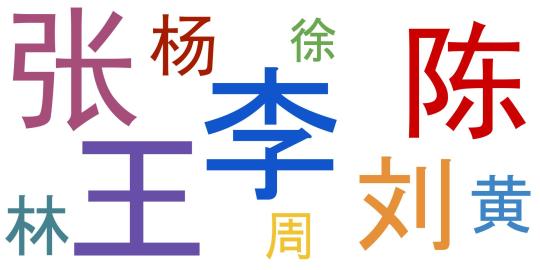
Since surname rankings are actually known, I thought it would be interesting to briefly compare my dataset to the true populations.
Top Surnames
李 Lǐ / 240
王 Wáng / 206
张 Zhāng / 186
陈 Chén / 173
刘 Liú / 147
杨 Yáng / 94
林 Lín / 91
黄 Huáng / 88
周 Zhōu / 69
徐 Xú / 66
Mainland Top Surnames
李 Lǐ
王 Wáng
张 Zhāng
刘 Liú
陈 Chén
杨 Yáng
赵 Zhào
黄 Huáng
周 Zhōu
吴 Wú
Taiwan Top Surnames
陈 Chén
林 Lín
黄 Huáng
张 Zhāng
李 Lǐ
王 Wáng
吴 Wú
刘 Liú
蔡 Cài
杨 Yáng
What stood out to me most was 林 making #7 on my list. I suspect this is due to the inclusion of Taiwanese names. In Mainland China it actually ranks around #16 I believe. 赵 didn't make the top 10, but I think it was actually #11, so that's not too far off.
About the Data Cont'
For my original posts 1.5 years ago, I had difficulty maintaining a gender balance and decided to add male names from other types of sources as a supplement. I have since regretted that choice, so this time I worked hard to maintain balance without using unrelated sources. One result of this is that there are names in the original dataset that do not appear in this dataset, so even though the new dataset has more names, it's possible that there could be fewer occurrences of some characters. I did my best to remove duplicate individuals (not duplicate names!) and remove stage names that do not sound like real names (or replace them with real names). However, I did not try to swap out all stage names for birth names because that would have been too difficult and time consuming. I also made the assumption that any four-character name could be segmented into two surname characters and two given name characters. It's important to note that these names are not necessarily representative of the 15-30 population as a whole. Idols or trainees might change their names to something sounding more cool or hip, and like I mentioned, it simply wasn't feasible for me to find everyone's birth name. And my data collection didn't take into account things like geography/population spread or keep track of ages (but I did for the most part avoid any shows older than 5 years and groups with members 30+).
Extended Lists
Top Given Name Characters
28 星 xīng - star, heavenly body / 31 29 梦 mèng - dream, to dream / 31 30 倩 qiàn - pretty, winsome / 29 31 涵 hán - to contain, to include, culvert / 29 32 艺 yì - skill, art / 29 33 雅 yǎ - elegant / 29 34 雪 xuě - snow / 29 35 君 jūn - monarch, lord, gentleman, ruler / 28 36 翔 xiáng - to soar, to glide / 27 37 霖 lín - continued rain / 27 38 哲 zhé - wise, a sage / 26 39 梓 zǐ - Catalpa kaempferi (type of tree), printing blocks / 26 40 羽 yǔ - feather, 5th note in pentatonic scale / 26 41 诗 shī - poem, poetry, verse / 26 42 凯 kǎi - triumphant, victorious / 25 43 家 jiā - home, family / 24 44 小 xiǎo - small, tiny, few, young / 24 45 洋 yáng - ocean, vast, foreign, silver dollar or coin / 24 46 铭 míng - to engrave, inscribed motto / 24 47 奕 yì - abundant, graceful / 23 48 柏 bó - cedar, cypress / 23 49 静 jìng - still, calm, quiet, not moving / 23 50 馨 xīn - fragrant / 23 51 丹 dān - red, pellet, powder, cinnabar / 22 52 安 ān - content, calm, still, quiet, safe, secure, in good health, to pacify, to harbor (good intentions), security, safety, peace / 22 53 洁 jié - clean / 22 54 然 rán - correct, right, so, thus, like this / 22 55 瑶 yáo - jade, precious stone, mother-of-pearl, nacre, precious / 22 56 心 xīn - heart, mind, intention, center, core / 21 57 扬 yáng - to raise, to hoist, scattering (in the wind), to flutter / 21 58 玉 yù - jade / 21 59 阳 yáng - sun, male principle / 21 60 源 yuán - root, source, origin / 20 61 琦 qí - curio, valuable stone / 20 62 瑞 ruì - lucky, auspicious, propitious, rayl / 20 63 莹 yíng - luster of gems / 20 64 丽 lì - beautiful / 19 65 宁 níng - peaceful, to pacify / 19 66 语 yǔ - dialect, language, speech / 19 67 云 yún - cloud / 18 68 敏 mǐn - quick, nimble, agile, clever, smart / 18 69 琳 lín - gem / 18 70 睿 ruì - astute, perspicacious, farsighted / 18 71 菲 fēi - luxuriant (plant growth), rich with fragrance / 18 72 辉 huī - splendor, to shine upon / 18 73 颖 yǐng - head of grain, husk, tip, point, clever, gifted, outstanding / 18 74 依 yī - to depend on, to comply with or listen to sb, according to, in the light of / 17 75 妍 yán - beautiful / 17 76 希 xī - to hope, to admire / 17 77 昊 hào - vast and limitless, the vast sky / 17 78 超 chāo - to exceed, to overtake, to surpass, to transcend, to pass, to cross, ultra, super / 17 79 龙 lóng - dragon, imperial / 17 80 东 dōng - east , host / 16 81 凡 fán - ordinary, commonplace, mundane, temporal, of the mortal world, all, whatever, altogether, gist, outline, note of Chinese musical scale / 16 82 媛 yuán - beautiful / 16 83 宏 hóng - great, magnificent / 16 84 志 zhì - aspiration, ambition, the will / 16 85 昕 xīn - dawn / 16 86 月 yuè - moon, month / 16 87 瑜 yú - excellence, luster of gems / 16 88 紫 zǐ - purple, violet / 16 89 航 háng - boat, ship, craft, to navigate, to sail, to fly / 16 90 钰 yù - treasure, hard metal / 16 91 雯 wén - multicolored clouds / 16 92 �� yuán - currency unit, first, original, primary, fundamental, constituent, part, era / 15 93 廷 tíng - palace courtyard / 15 94 承 chéng - to bear, to carry, to hold, to continue, to undertake, to take charge, owing to, due to, to receive / 15 95 晴 qíng - clear, fine (weather) / 15 96 美 měi - beautiful, very satisfactory, good, to beautify, to be pleased with oneself / 15 97 言 yán - words, speech, to say, to talk / 15 98 逸 yì - to escape, leisurely, outstanding / 15
Top Single-Character Names
12 佳 jiā - beautiful, fine, good / 5 13 倩 qiàn - pretty, winsome / 5 14 凡 fán - ordinary, commonplace, mundane, temporal, of the mortal world, all, whatever, altogether, gist, outline, note of Chinese musical scale / 5 15 宇 yǔ - room, universe / 5 16 帅 shuài - handsome, graceful, smart, commander in chief / 5 17 悦 yuè - pleased / 5 18 杰 jié - hero, heroic, outstanding person, prominent, distinguished / 5 19 洁 jié - clean / 5 20 聪 cōng - wise, clever, sharp-witted, intelligent, acute, quick at hearing / 5 21 萌 méng - to sprout, to bud / 5 22 霖 lín - continued rain / 5
Top Two-Character Names
9 丽娜 lìnà / 3 10 丹妮 dānnī / 3 11 佳慧 jiāhuì / 3 12 佳欣 jiāxīn / 3 13 依依 yīyī / 3 14 俊毅 jùnyì / 3 15 博文 bówén / 3 16 嘉宝 jiābǎo / 3 17 嘉怡 jiāyí / 3 18 媛媛 yuányuán / 3 19 子铭 zǐmíng / 3 20 子龙 zǐlóng / 3 21 家豪 jiāháo / 3 22 心怡 xīnyí / 3 23 心雨 xīnyǔ / 3 24 思佳 sījiā / 3 25 思雨 sīyǔ / 3 26 晨曦 chénxī / 3 27 梓豪 zǐháo / 3 28 梦瑶 mèngyáo / 3 29 欣妤 xīnyú / 3 30 浩宇 hàoyǔ / 3 31 美琪 měiqí /3 32 诗琪 shīqí / 3 33 雨晴 yǔqíng / 3 34 雨航 yǔháng / 3 35 雪莹 xuěyíng / 3 36 静怡 jìngyí / 3
Well, if you made it to the end, congratulations! You are a brave soul. But seriously, thanks so much for reading all of this monster of a post. I hope you leave knowing at least a bit more about Chinese names.
2K notes
·
View notes
Text
Short post about filming C-dramas - Hengdian

So I noticed a lot of people keep commenting that sets and “cities” in C-dramas that had basically no budget as being super pretty and that they can’t believe they managed that with no money. Here’s the thing: Many C-drama are filmed in Hengdian. There are a few other filming studios that are also popular, but I would say Hengdian is in the top 3, or maybe top 1.
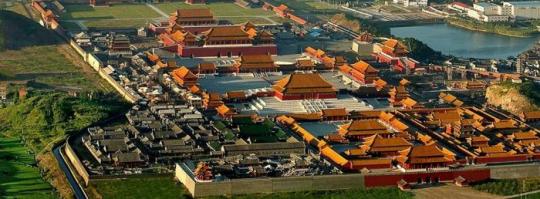
Hengdian is one of the largest film studios in the world and is one of the most popular places to film a period drama (area total of 3,3 km2 and building areas of 495,995 m2).

If I remember correctly, there are at least 13 shooting bases. Some buildings, palaces, areas are made in the style of Qin and Han dynasty, others are exact replicas of certain buildings (like Yuanming Yuan, the old summer palace).

It’s FREE to film in Hengdian. How do they stay in business, you ask? They make the money from hotels, restaurants, and renting out equipment & costumes. Some dramas or movies take only 1 month to film, others can take several months. Also Hengdian is huge, if you couldn’t tell, so there can be several film crews working at the same time.
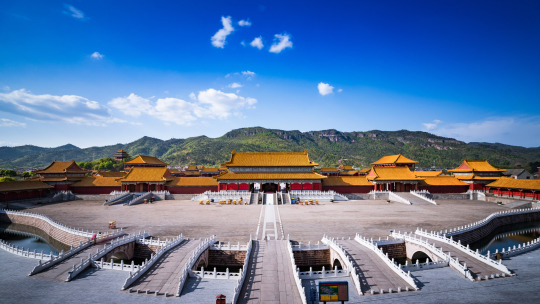
I would also like to point out that you can visit as a tourist.

So far there are over 1200 films and C-dramas that have been filmed in Hengdian! Crouching Tiger Hidden Dragon, Hero, The Forbidden Kingdom, Mulan are some films that were filmed there.

If you watch other Chinese period dramas, you will recognize several buildings. Some C-dramas in recent years you might recognize are Once Upon A Time in Lingjian Mountain, Joy of Life, The Untamed, Word of Honor.
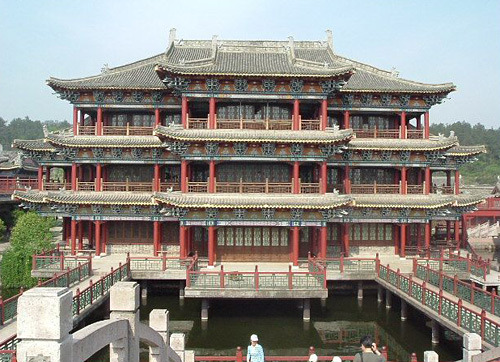
Like this one! Recognize it? It’s where they had that boyband karaoke consert thing in Once Upon a Time in Lingjian Mountain
Click here for a clip of the concert haha
July 3 2021
5K notes
·
View notes
Text
A Resource for Reading Practice: The Chinese Reading World
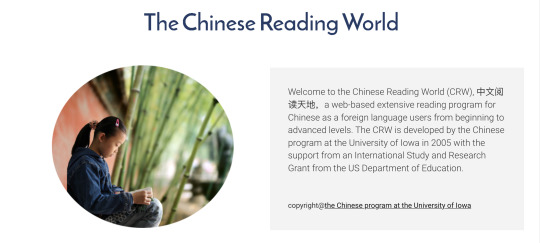
I wanted to share a resource for reading practice that I stumbled across recently. It’s called the Chinese Reading World, and it was a project led by the University of Iowa.
The site was put together from 2005 to 2008, so it’s not super up to date. However, there is a ton of content! Everything is sorted into 3 levels: beginning, intermediate, and advanced.
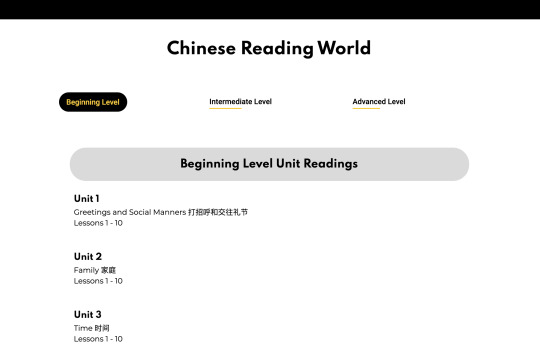
Each level has 30 units, and each unit has 10 lessons. The lessons begin with a vocab pre-test, then there is a reading with some comprehension questions. Lastly, there is a vocab post-test, which is the same as the initial test (at least for the lessons I’ve done so far). There’s audio for each lesson text, but unfortunately it can’t be streamed—you have to download it. There is also an achievement test at the end of each unit.
My experience has actually been that I already know all the words on the vocabulary tests, but the reading passages contain other words that I’m not familiar with.

So far, the readings I’ve encountered are not very long. This is nice since reading longer pieces can be frustrating at times. With shorter readings, you can just read 1 or 2 on some days and read more when you have more time/patience. I believe the readings are taken from Chinese newspapers.
Also, every unit has a theme. With 90 units total, there are bound to be themes that interest you. Example unit topics:
Directions and Asking Direction 方向和问路
Sports and Outdoor Activities 体育和户外运动
Chinese Music and Musicians 中国音乐和音乐家
Chinese Minorities and Local Customs 地方习俗和民族风情
Chinese Sports and Olympic Games 体育和奥林匹克
Contemporary Chinese Literature and Writers 中国当代文学和作家
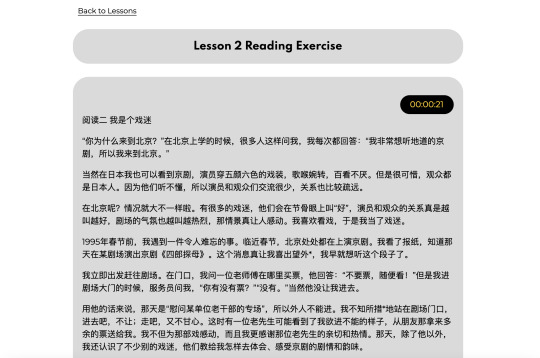
The 3 levels also each come with 5 proficiency tests. They seem to be based on vocabulary knowledge, so expanding your vocab is clearly a huge focus of this site. The only thing I’m unclear is about is I’m not sure exactly when the proficiency tests are meant to be taken. After completing all units? Or are they spaced out so you are supposed to take test 1 after the first few units, test 2 after the next few, etc.?

I’ve started working my way through the advanced section this week. With 300 advanced lessons alone, it really feels like I have an infinite number of articles to go through!
2K notes
·
View notes
Text

天若有情 | A Moment of Romance
28K notes
·
View notes
Text
been awhile since i’ve posted, but here’s a chinese rnb playlist i made the other day <3
好久没发了,这是我前几天做的一个中文的rnb播放列表 <3
1 note
·
View note
Note
Hi! If it's not too much trouble please recommend more Chinese rock singers? I listened to xtx because of you and liked his music so much!
Hm, well I actually don't know that many Chinese language artists myself and I largely listen to individual songs > artists.
I also can't promise all of these will be some type of rock bc I can't tell to begin with, but hopefully it'll be a good jumping off point? I'm going to recommend songs rather than just artists:
Cui Jian is the actual "Godfather of Chinese Rock" (he's from the 80s). His song "一无所有 (Nothing to My Name)" was adopted as a youth anthem in the 80s although it was originally a love song (the lack of subject/pronouns in Chinese makes the lyrics malleable to other themes)
Da Zhuang / 大壮 might be considered more of a ballad or rock ballad singer but he has a lot of great songs. "伪装 (Disguise)" is one of my favorites.
"追夢赤子心 (Boy's Dream)" by GALA is more distinctly rock (I'm also in the midst of translating a live performance of this song right now!).
“往后余生 (For the Rest of My Life)" by Ma Liang was one of the most popular songs of 2018 in China.
I would also be remiss to not mention the artists I've already translated here.
刘森 (Liu Sen) is an emerging folk rock singer that I really like. I translated one of his songs here: 县城 (County Town).
信乐团/Shin is responsible for two of my favorites: One Night in Beijing (which is popular again on douyin rn) and 离歌 (Breaking Up Song)
刀郎/Dao Lang was extremely popular in the mid 2000s for multiple songs and is still great. I translated "西海情歌 (Yellow Sea Love Song)" and"披着羊皮的狼 (A Wolf In Sheep’s Clothing)".
五月天/Mayday is also a popular rock band although it's my opinion that every cover I've heard of of their songs is better than the original. "倔强 (Stubborn)" is good.
Speaking of Mayday, 伍佰/Wu Bai is pretty legendary. 挪威的森林(Norwegian Forest) and Last Dance are classics.
Snow Red by R.Chord (I think this might be pop rock?)
狮子LION is a great younger group also; "我们的爱 (Our Love)" [rock ballad], and "天亮以后说分手 (Till Dawn We Cherish)" [genre of: "goes much harder than the previous song"]
權御天下 (Sun Quan The Emperor) by 圈9 & 嗨的國樂團Hidii & 千指大人 uses multiple traditional Chinese instruments including the zither and erhu, although I haven't really heard much else from them.... probably because I can't tell if they're a band or multiple acts collaborating.
I think a lot of singers I listen to might actually be classified as pop or indie singers which is confusing so I'm just going to stop here lol. Hope you find something good out of at least one of these!
250 notes
·
View notes
Text
Color Terms You Didn’t Learn in Chinese Class

In your Chinese studies you’ve probably learned: 红色、橙色、黄色、绿色、蓝色、紫色、灰色、白色、黑色、咖啡色、粉红色
But there are so many beautiful colors out there! Let’s learn some more. These are color terms I’ve come across outside Chinese class.
In general you can indicate a light shade with 浅 and a dark shade with 深. I have also seen 墨 for dark and 淡 for light, but when I Googled various color terms, there were more results for 浅 and 深 than 淡 and 墨.
I spent way too much time messing with HTML to color the text to match (except for the shades of white).
褐色 hèsè - brown
橘黄色 júhuángsè - orange
奶油色 nǎiyóusè - cream
金黄色 jīnhuángsè - gold color
朱红色 zhūhóngsè - vermilion
米色 mǐsè - beige
棕色 zōngsè - brown
青色 qīngsè - cyan / blue-green
��白 huībái - light gray / ash-colored
蔚蓝 wèilán - azure / sky blue
纯白 chúnbái - pure white
雪白 xuěbái - snow white
洁白 jiébái - spotlessly white / pure white
漆黑 qīhēi - pitch-black
铜色 tóngsè - copper
乌黑 wūhēi - jet-black / dark
靛色 diànsè - indigo (color)
金色 jīnsè - golden / gold (color)
银色 yínsè - silver (color)
Here are some single characters I’ve seen as well. Some of these are commonly used in names, like 彤 and 丹.
彤 tóng - red
丹 dān - red / pellet / powder / cinnabar
缇 tí - orange-red silk / orange-red colored
赤 chì - red / scarlet / bare / naked
碧 bì - green jade / bluish green / blue / jade
翠 cuì - bluish-green / green jade
皓 hào - bright / luminous / white (esp. bright white teeth of youth or white hair of old age)
颢 hào - bright / white
玄 xuán - black / mysterious
彤, 丹, and 缇 are all described as a red-orange color. I’m not really sure of the difference, so I just made them all the same shade. I’m also unclear on exact distinction between 褐色 and 棕色. Image search results certainly suggest that they are used differently. Not sure how 咖啡色 fits in either.
I stumbled across this giant Wikipedia table with many beautiful colors that you can check out to learn more!
2K notes
·
View notes
Text
Learning Chinese with Lyrics #03
歌曲: 水藍色情人 (Blue Lover) 歌手: 楊宇騰 (YU)
To celebrate all the promo pics for WBL Boy's Vacation (coming out 11/12!) today's LCWL is YU's Blue Lover :-) The lyrics are so pretty....that bridge into the chorus and then the "水藍色在你眼裡看起來很浪漫" verse....ㅠㅠ
youtube
隱約還未退去的潮水 因為你而炙熱的夏天 愛躲在你裡面 一直在繞圈圈 說與不說都很曖昧 好想讓你知道不必等到明天
隱約 [yǐnyuē] - vague, faint -> EX: 有幾束隱約的陽光使陰暗的下午有些明亮。 A few faint gleams of sunshine lit up the gloomy afternoon. 退去 [tuìqù] - to retreat 潮水 [cháoshuǐ] - tide -> EX: 隱約還未退去的潮水 The faint tide has not yet receded 炙熱 [zhìrè] - extremely hot (weather)/blazing 曖昧 [àimèi] - ambiguous (usually meaning ambiguous relationship between two people, or an affair)
如果你也想 趁這場雨輕輕打散某個習慣 讓感覺天旋地轉不只是心安 從未擁有的呼喚 喚醒我的存在 只想聽你反覆說愛
趁 [chèn] - to take advantage of -> EX: 趁這場雨輕輕打散某個習慣 Take advantage of this rain to gently break a habit 天旋地轉 [tiān xuán dì zhuàn] - idiom: the sky spins, the earth revolves (meaning: a metaphor for major change, or the feeling of dizziness/trouble) 喚醒 [huànxǐng] - to wake somebody 反覆 [fǎnfù] - repeatedly/over and over
水藍色在你眼裡看起來很浪漫 或許幻想不再只是讓我心安 陽光灑成一片海 你在我心裡承載
浪漫 [làngmàn] - romantic 或許 [huòxǔ] - perhaps, maybe 幻想 [huànxiǎng] - delusion/fantasy 灑 [sǎ] - to shed/to spill -> EX: 陽光灑成一片海 The sun spills into the sea
喜歡你話語裡的哲學 同一首歌播放一整天 愛躲在你身邊 明明轉眼之間 卻好像懂我好多年 好想讓你知道不必等到明天
哲學 [zhéxué] - philosophy 播放 [bōfàng] - to broadcast/air (a TV/radio program)
如果你也想 趁這場雨輕輕打散某個習慣 讓感覺天旋地轉不只是心安 從未擁有的呼喚 喚醒我的存在 只想聽你反覆說愛 水藍色在你眼裡看起來很浪漫 或許幻想不再只是讓我心安 陽光灑成一片海 你在我心裡承載 你的氣息 你的聲音 最近的距離 安靜地徹底 悶熱讓時間暫停 下一場太陽雨 我無法停止想念你
氣息 [qìxī] - breath 徹底 [chèdǐ] - thoroughly/completely 悶熱 [mēnrè] - sultry/stuffy/stifling hot
趁這場雨輕輕打散某個習慣 讓感覺天旋地轉讓彼此心安 從未擁有的呼喚 喚醒我的存在 只想聽你反覆說愛 水藍色在你眼裡看起來很浪漫 請讓幻想不再只是讓我心安 陽光灑成一片海 你在我心裡承載
彼此 [bǐcǐ] - each other -> EX: 我們彼此相愛。 We love each other.
39 notes
·
View notes



